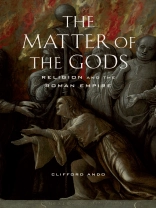What did the Romans know about their gods? Why did they perform the rituals of their religion, and what motivated them to change those rituals? To these questions Clifford Ando proposes simple answers: In contrast to ancient Christians, who had faith, Romans had knowledge, and their knowledge was empirical in orientation. In other words, the Romans acquired knowledge of the gods through observation of the world, and their rituals were maintained or modified in light of what they learned. After a preface and opening chapters that lay out this argument about knowledge and place it in context,
The Matter of the Gods pursues a variety of themes essential to the study of religion in history.
Tabella dei contenuti
Preface
Acknowledgments
Abbreviations
1. Religion, Law, and Knowledge in Classical Rome
part one. the limits of orthopraxy
2. Idols and Their Critics
3. Interpretatio Romana
4. Religion and Ius Publicum
part two. gods of the far-flung empire
5. A Religion for the Empire
6. Religion and Imperialism at Rome
7. The Palladium and the Pentateuch
Bibliography
Index Locorum
General Index
Circa l’autore
Clifford Ando is Professor of Classics, History and the College at the University of Chicago and author of Imperial Ideology and Provincial Loyalty in the Roman Empire (UC Press), winner of the Charles J. Goodwin Award of Merit from the American Philological Association, among other books.












